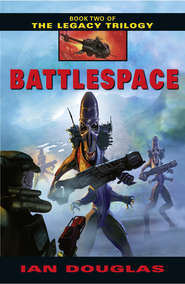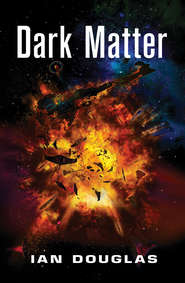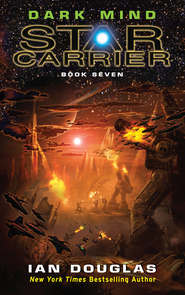По всем вопросам обращайтесь на: info@litportal.ru
(©) 2003-2025.
✖
Semper Mars
Настройки чтения
Размер шрифта
Высота строк
Поля
Twenty-One
“Cheyenne Mountain, Shepard,” Colonel Dahlgren said, peering into the telescopic…
Twenty-Two
They’d broken out of the narrow canyon that stretched across…
Twenty-Three
Thirty hours after the MMEF’s triumphant return to Mars Prime,…
Twenty-Four
“Down!” Caswell cried, throwing herself facedown into the sand. “We’re…
Twenty-Five
Kaitlin was on the floor in the den playing chess…
Epilogue
Marine Lieutenant Kaitlin Garroway walked through the automatic doors of…
Other Books by Ian Douglas
Copyright
About the Publisher
Map
2039
PROLOGUE
MONDAY, 6 JUNE
Office of the Chairman of the
Joint Chiefs of Staff (CJCS)
The Pentagon, Washington, DC
0950 hours EDT
“Christ, CJ! You can’t let them do this to us!”
General Montgomery Warhurst teetered between radically opposing strategies, storming and pleading. The five-star admiral seated behind the broad and brightly polished oak desk before him was not only his commanding officer, but his friend. He and Admiral Charles Jordan Gray went way back. They’d been middies together at the Naval Academy, Warhurst in the Class of ’08, Gray in the Class of ’07. Since their postings to the five-sided squirrel cage, they’d attended one another’s social affairs, had barbecues in each other’s backyards, and shared the same wry disdain for Beltway politics. For them, the old Marine-Navy rivalry was a seal on their friendship, banter and laughing bluster over a couple of beers.
But, by God, Warhurst wasn’t going to let them kill the Corps, wasn’t going to let C. J. Gray kill the Corps, not if he had one thin, ragged breath.
Gray gave him a sad smile. “What’s the matter, Monty? Trying to save your job?”
“That’s not funny. I may be commandant of the United States Marine Corps, but every Marine is a rifleman first. I’d resign in an instant if it would change this. You know that. I’d give my life for the Corps, CJ. I goddamn would.”
The smile vanished. “Jesus, Monty, I know how you feel, but—”
“Do you?” Warhurst gestured at the four-meter flatscreen dominating the wall behind Gray’s desk. The display repeated in hand-high letters the document called up by the admiral’s wrist-top. The words “HR378637: The Unified Military Act” showed at the top of the neatly formatted document in punch-to-the-stomach bold. “The BBs’ve been whittling away at us for years now, cutting our appropriations until we’re damn near running on empty. Now it’s…this.”
Warhurst stopped himself. He was breathing hard, and he could feel the rising flush in his face, feel the blood hammering at his temples. His meds monitor would be kicking in any second now if he kept this up, but, damn it, the BBs—Pentagon slang for “Beltway Bastards”—never failed to raise his blood pressure.
And now they were trying to kill the Corps. His Corps!…
“There’s not a damned thing I can do about it,” the admiral said, shaking his head. His gaze flicked to the left, to the large, 3-D image of a grinning civilian on the wall to his right. “Archy’s backing this thing, and that means it’ll have the president’s approval.”
“Severin is a political hack. He’s also an Internationalist—”
“May I remind you that Archibald Severin is secretary of defense, which makes him our political hack. That means you, me, and the rest of the Joint Chiefs answer to him…and after him the NSC and the president. They pass the word, and we snap to attention, say ‘Yes, sir,’ and politics never rears its ugly face.”
“Everything in Washington is politics, CJ, and that includes the Pentagon and everyone in it. You know that as well as I do.”
“Maybe. But the final word comes from a document you may have heard of: the Constitution, remember? It says we work for the politicians. Not the other way around.”
“I never suggested any different. But this Unified Military Act is political. You know it. I know it. And there’s a political way to fight back.”
“And what might that be?”
“Public opinion.”
The admiral groaned, shifting in his chair. “Jesus, Monty—”
“It’s worked before. Truman? A century ago?” President Harry S Truman, a former artillery officer in the Navy, had come that close to shutting down the Marine Corps in the years immediately after World War II, declaring it to be unnecessary. Public opinion, however—the opinion of Americans who remembered names like Wake, Tarawa, and Iwo Jima—had secured a place for the Corps, by law, in the National Security Act of 1947. And that wasn’t the first time Washington politicians had tried to kill or dismember the Corps. Congress alone had tried it on no fewer than five separate occasions between 1829 and the 1940s.
And each time, public opinion, in one way or another, had played a part in rescuing the Corps from the budget cutters’ hatchets.
“I know that look,” the admiral said. “You’ve got something in mind, or you wouldn’t be in here waving your arms at me.”
Warhurst bent over, picked up the briefcase he’d set on the thick-carpeted floor when he’d entered the CJCS’s office ten minutes before, and set it on Gray’s desk. Touching the lock points, he opened it wide and extracted his PAD, which he slid across the desk, screen up.
Gray picked the thin panel up, his touch awakening the screen. He frowned as he read the document displayed there.
“Mars? You want the Marines to go to…Mars?”
“To safeguard American interests there, CJ. The same way the Marines have safeguarded American interests all over this world.”
Gray touched the turn-page corner of the PAD. “How big an operation is this?”
“The logistics are laid out on page five,” Warhurst said. “I’m suggesting one platoon, twenty-three men. Plus an HQ element. Thirty men in all.”











